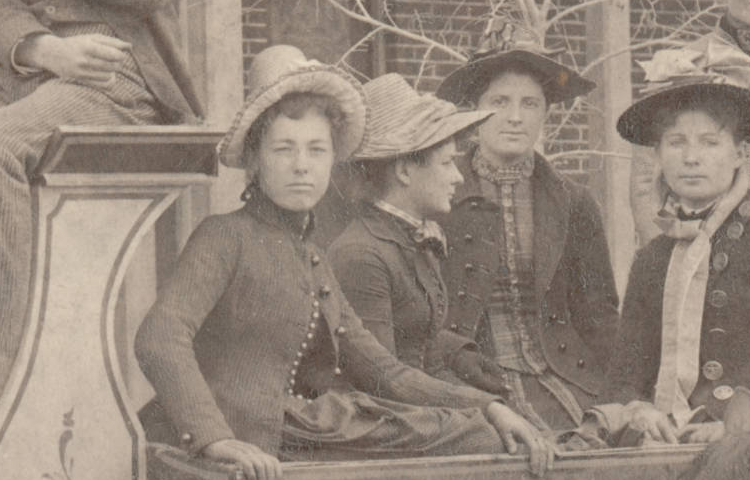A key figure in the history of Unitarianism in Palo Alto, and a Mexican-American (but not an immigrant), Isabel Dye was born July 9, 1840 (other sources say June, 1840), in an old adobe house in Santa Cruz, California, the child of Job Francis Dye and Ecolástica Rodriguez.
Isabel’s mother, Ecolástica Rodriguez, born in 1822, was a Mexican citizen — this was before Mexico ceded California to the U.S. — and reportedly the daughter of the Minister to Mexico from Spain. As a young beauty, Ecolástica owned a Parisian lace dress, allegedly worth $1,000 when new (roughly $24,000 in 2015 dollars).
Isabel’s father, Job Francis Dye, was born in Kentucky in 1807, and traveled over land to southern California, arriving in Jan., 1832. In 1839, he lived in Monterey, where he met and married Ecolastica; ran a distilling business in Santa Cruz in 1840, where Isabel was born. The family returned to Monterey when Isabel was barely a year old; she was carried by her father on a pillow on his saddle.
Not long thereafter, Job received a land grant from the Mexican government of 26,700 acres along the Sacramento River in what is now Tehama County. The family stayed in Monterey, but Job had 1,000 head of cattle and 200 horses on the Central Valley ranch, called “Antelope Rancho.”
When she was about five years old, Isabel’s mother drove her around in old Monterey, bringing baskets of food and clothing to poor people. She continued doing charitable and benevolent work throughout her life.
In 1848, Job went to fight with General Fremont of the U.S., and Isabel Fremont and his troops march into Monterey. She gave a loud “Hurrah!” when she saw them, only to be slapped on the face by Alvarado, an older relative on her mother’s side. She participated in the raising of the new flag in Monterey.
The Gold Rush prompted Job to move to Antelope Ranch in 1849, to take advantage of economic possibilities there. Isabel, however, went to school at Notre Dame Convent in San Jose, a part of the first class of students in that school. Her chief attainments at school were facility in a number of languages, and skill at the piano.
Within a few years of the move, Job and Ecolástica apparently divorced, for Job married a second wife in 1853. Isabel went to live with her father in Tehama County, and at this time broke with her mother’s Catholic religion.
Isabel married John Strange Butler Jan. 15, 1859, in Tehama County, Calif. John was born Nov., 1829, in Indiana; he came to California in 1852, and after mining for three years started the first newspaper in Red Bluff, Tehama County, Calif.
She and John had four children of their own: Thomas (b. c. 1860), Minnie (b. Dec., 1861), Charles E. (b. April 14, 1868, Idaho; d. Dec. 20, 1897, Palo Alto), and Isabel (b. Jul., 1872). She also took care of 28 orphans over the course of her life. The first orphan she took in was in the early years of her married life; after whites massacred local native Americans, there were several babies left alive, and Isabel took one in.
After starting the newspaper, John S. then turned to farming until in Sept., 1862, Job Dye asked him to help sell cattle to miners headed to the silver mines in Idaho. He decided to start a newspaper in Idaho with his brother Thomas, and by Sept., 1863, they began publishing the Boise News. The rest of the family joined him in Idaho, and Isabel and John’s third child, Thomas E., was born in Idaho in 1868.
Thomas and John tried to maintain political neutrality in their newspaper, but it was quickly apparent that they were die-hard Republicans, in a state dominated by Democrats who supported the Confederacy. Even though they were financially successful, they felt pressure to sell out to a Democrat. They went on to start two other newspapers elsewhere in Idaho. In 1870, John finally decided to leave Idaho and return to California. The family settled in Oakland, where John established a job and book printing business.
In Feb., 1877, Isabel came into a large amount of money. The San Francisco Call reported the story this way: “In 1877, Isabel came into a large amount of money: “Fortune has showered its gifts profusely on Mrs. I. Butler, wife of John S. Butler, a printer, of Oakland. Mrs. Maria Isabel Toomes, of Tehama county, came to San Francisco in ill-health some time ago for medical treatment. Six months heretofore she removed to Oakland and recovered rapidly, but two months ago she was seized with typhus fever and sank under it. She was accompanied to the city by her adopted daughter, an invalid, about 20 years of age, and by a housekeeper. Mrs. Butler, living next door to the sick lady, was Samaritan-like in her attentions, and, on her death-bed, Mrs. Toomes summoned her lawyer, and devised all her property, real and personal, to Mrs, Butler, merely stipulating that her adopted invalid daughter, Nellie Toomes, should be provided for and maintained during her life out of the estate.” (quoted from the Call in the Isabella County Enterprise, Mount Pleasant, Mich., Feb. 21, 1877)
The truth was less romantic. Maria Toomes was the wife of Albert G. Toomes, a partner of Isabel’s father, Job Dye, back in the Red Bluff days’ Albert and Job had received adjacent land grants from the Mexican government. Maria Toomes had grown up in Monterey, and probably knew Isabel there. in any case, Isabel inherited $141,000, equivalent to $3.1 million in 2015 dollars.
The Butlers moved to Palo Alto in the early 1890s. Rev. Eliza Tupper Wilkes, then serving part-time as the associate minister at the Unitarian Church in Oakland, and part-time helping start up new congregations throughout northern California, came to preach in Palo Alto several times in 1895. On Feb. 12, 1896, thirty people met in the Butler’s living room to form a “Unity Society,” a lay-led Unitarian fellowship; John became the Treasurer of the Committee on Executive and Finance. One wonders if the Butlers had been members of the Unitarian church in Oakland, and whether they helped bring Wilkes to preach in Palo Alto to help start up the new Unity Society.
The Unity Society did not last more than a year or two. But a core of Uitarians remained in Palo Alto, and finally in 1905, with the help of funding from the American Unitarian Association, a new Unitarian church was formed. Once again, the initial meeting was held in the Butler house.
Both Butlers were active in the new church. John once again became the Treasurer of the new organization. For her part, Isabel was one of the charter members of the Women’s Alliance. They were the largest single contributor to the fund to purchase a lot for the Unitarian Church building in 1905 ($200, about $5250 in 2015 dollars).
Isabel died June 4, 1913, after which John moved back to Oakland; he died there Oct. 30, 1916.
Notes: 1900 U.S. Census; Ewald Flügel, “Isabel Dye Butler: Memorial Address given at the Unitarian Church, Palo Alto,” Pacific Unitarian, July, 1913, pp. 264-266; Federal Writers Project, Works Progress Administration, California: A Guide to the Golden State, New York: Hastings House, 1939; “Job Francis Dye,” An Illustrated History of the State of Idaho, Chicago: Lewis Pub. Co., 1899; Ronnie R. Hayes, Idaho World: A Pioneer Chronicle of the Territory 1863-1918, dissertation, Univ. of Montana, 1982; obituary, Oakland Tribune, June 6, 1913, p. 10; Tehama County Genealogical and Historical Society, “Mexican Land Grants in Tehama County,” tcghsoc.org/MexicanLandGrantsTC.pdf, accessed Nov. 30, 2016; obituary, The Grizzly Bear, Los Angeles: Native Sons of the Golden West, July, 1913, p. 26; Harvard College Class of 1890, 1903-1909, 1909; “Active Veteran Printer Passes,” American Printer and Lithographer, New York: Oswald Publ., Nov. 20, 1916, pp. 54-55; death notice, San Francisco Call, June 6, 1913.




